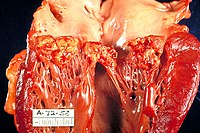
Photo from wikipedia
Purpose We aimed to document the performance of transthoracic echocardiography (TTE) and the spectrum of echocardiographic findings as complications associated with coronavirus disease 2019 (COVID-19). Methods & Materials A retrospective… Click to show full abstract
Purpose We aimed to document the performance of transthoracic echocardiography (TTE) and the spectrum of echocardiographic findings as complications associated with coronavirus disease 2019 (COVID-19). Methods & Materials A retrospective analysis was performed among adult patients admitted to a tertiary care government hospital in Maharashtra between January 01, 2021 and May 31, 2021. Patients were included if they underwent TTE during the hospitalization after a known positive diagnosis for COVID-19. Demographic and clinical data were obtained using chart abstraction from the medical record system. Results Of 1539 patients, 187 (12.15%) underwent TTE following positive results on severe acute respiratory syndrome coronavirus-2 polymerase chain reaction testing. The most common clinical indications for TTE were concern for a major acute cardiovascular event (52.95%) and hemodynamic instability (32.29%). Although most patients had preserved biventricular function, 41.30% were found to have left ventricular ejection fractions ≤ 50%, and 13.9% had at least moderately reduced right ventricular function. Eleven patients had wall motion abnormalities suggestive of stress-induced cardiomyopathy. Using Spearman rank correlation, there was an inverse relationship between high-sensitivity troponin T and left ventricular ejection fraction (ρ = -0.41, P < 0.01). Amongst 37 patients with prior echocardiograms, only seven (18.91%) had new reductions in LVEF of >10%. Clinical management was changed in seventeen individuals (26.98%) in whom TTE was ordered for concern for acute major cardiovascular events and seven (14.58%) in whom TTE was ordered for hemodynamic evaluation. Conclusion Our study describes the clinical indications for use and diagnostic performance of TTE, as well as findings seen on TTE, in hospitalized patients with COVID-19. In appropriately selected patients, TTE can be an invaluable tool for guiding COVID-19 clinical management.
Journal Title: International Journal of Infectious Diseases
Year Published: 2022
Link to full text (if available)
Share on Social Media: Sign Up to like & get
recommendations!